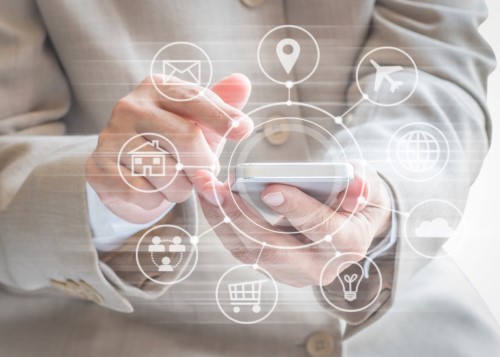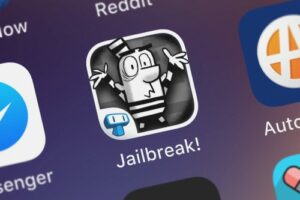We live in a dysfunctional reality where you can be minding your own business, sipping a cold one in your backyard, and Google or Amazon tracking everything you are doing. From basing new ads on your Spotify playlist or looking at your geolocation for social media suggested posts, Big Tech has its eyes on your smartphone.
Terrifying, isn’t it? The fact is, every one of us has become a digital goldmine for companies seeking to leverage our personal data for all kinds of new uses. However, there may be a way to protect your online privacy better and ensure you don’t feed this giant machine.
How much do we not care? 32% of cell owners have cleared their browsing or search history Instead of focusing on lowering the chance of people tracking information, we decided to leave it all out there for the world to see. Isn’t it time you took the ultimate step to reclaim your digital sovereignty?
Our team at Freedom Technology and Services is here to help guide you from taking your Android or iPhone mobile phone and turning it into the ultimate privacy phone.
What the Bloody Hell is Smartphone Privacy?
If you’re like 84% of smartphone users who say privacy is an essential factor when installing an app, you might already be familiar with some aspects of data tracking. But let’s get real: even with permissions and privacy policies, tech giants like Google and Apple are incredibly efficient at collecting your data.
These companies are so ingrained in our digital ecosystem that escaping their grasp seems nearly impossible. With trackers from Google’s parent company, Alphabet, in nearly 90% of free Android apps, your everyday apps act like mini spy agencies.
The idea is to make money by targeting your everyday activities through your smartphone. For example, if you frequently go to the same coffee shop for your morning Joe while listening to today’s Top 40, then you will get ads more aligned with a younger crowd. Or, if you prefer to go to your pediatrist weekly after taking your tiny puppy to the dog park, then you are probably a little older.
These Big Tech companies can do everything from listening in on your iPhone’s microphone for keywords you say out loud to tracking your web search for hints on what you want for Christmas. In return, they get to cater their ads so that when you see one, you cannot help but click to make a purchase. Think of these companies as tiny little psychologists and marketers just waiting for you to tell them all your fears, desires, and actions.
How Do DeGoogled Privacy Phones Help?
So, what’s DeGoogling? It’s your ticket to a smartphone that doesn’t make you the product. We’re talking about a stripped-down, privacy-focused version of Android without Google’s intrusive elements or, if you’re brave, a jailbroken iPhone with privacy-oriented customizations.
Every app you download to your Android or iPhone comes with tracking data. In most cases, this is to improve the apps for future iterations whenever there is an update. In other cases, you are giving a faceless corporation all the information they want about your personality and needs.
A deGoogled privacy phone gives you all the benefits of mobile devices and modern applications without risking privacy. It minimizes the risk of Big Tech, government oversight, or hackers getting into your smartphone – and in many cases – stealing your personal data.
Migrating Data to Your DeGoogled Android
So, how do you transition smoothly without losing precious data? Don’t worry. There are plenty of online or cloud-based services that are well-trusted. We don’t suggest Dropbox, Google Drive, One Drive or iCloud as these tend to have a history of leaks. You are better off with Mega (www.mega.nz) or proton drive.
The problem is most guides will walk you through Dropbox, Google Drive, or OneDrive for Microsoft. While those do have the capacity, they don’t have the security and anything that goes into those folders, count them as having been read. And why taint your new open-source operating system.
An easy start would be to use your file explorer on your PC. You can do this by:
- Linking your Android/Pixel to your PC through your USB cable.
- Activate Transfer files/MTP Mode.
- Select your Android device inside your File Explorer.
- Drag and Drop all the data available onto your PC folder.
This method is best for videos, photos, and music. It isn’t the best for contacts, app data, or messages, but a good place to start. Now you will need to use Mega.nz for the rest of the data in your messages, SMS, and contacts.
- Step #1: Export Contacts and SMS – Export your contacts and text messages and save them to your Mega.nz cloud. You do this through the Contacts app by exporting to a .VCF file that you can store in the cloud or on your PC.
- Step #2: Setting Up Mega.nz – Why Mega.nz? It offers encryption and isn’t tied to the big tech ecosystem. All you need to do is set up a username/password through your email and you’ll get up to 20GB for the free plan.
- Step #3: F-droid and Simple SMS – Use the Simple SMS app from F-droid as your default messaging app on your deGoogled phone.
- Step #4: The Mega.nz Transfer – Find your files on Mega.nz and download them to your new phone. Import your contacts and SMS via the Simple SMS app.
Yes, this does oversimplify the entire process, but it should be enough to get you started. You can also email the exported files to yourself, download them on your new phone, and then import, but be sure you’re using a safe email system that works with this particular framework.
Again, you are moving to new apps, so most of the specific app data will be lost or held within the online environment of the app itself. For example, all of the deGoogled phones from Freedom Technology and Services come pre-installed with numerous safe, secure, and open-source applications for you to experience.
Great, Now What About an iPhone?
The struggle with getting all your data safely stored from an iPhone into a deGoogled phone is the hardware and operating system. Apple products are notoriously tricky to jailbreak (get away from the native operating system). In many cases, this can lead to your device failing or losing any way to update the firmware outside the iOS ecosystem.
However, jailbreaking is a reasonably straightforward process and opens the doors to getting apps outside the Apple storefront. That creates better chances of finding privacy-oriented providers and mobile apps.
If you do decide to move from an Apple device, you will need to back up all your information. That isn’t easy because you typically have to rely on iCloud services. Yes, you will need to go through iCloud. Export the contacts and upload them to Mega.nz. From there, download and import them into your deGoogled iPhone.
Luckily, many GrapheneOS apps will import your data from an iPhone and integrate it into the new native environment. For example:
- Contacts: Import the vCard using the Contacts app.
- Messages (Text and iMessage): Importing iMessages is tricky. Text messages can be restored using third-party apps that can read the iTunes backup.
- Photos and Videos: Manually transfer these files to your new phone via USB or upload them to a secure cloud service.
- Apps and App Data: Re-download the apps from Aurora Store or alternative sources that have similar functions (Proton Mail for email, Brave Browser for Safari, etc.).
- Music: Transfer your music files via USB or upload to a music app that doesn’t rely on Google services.
- Calendar Events: Import the .ics file into your new calendar app.
- Notes: Retrieve notes from your email or download the note-taking app and sync.
- Passwords: Install the password manager and import your passwords.
- Files and Documents: Transfer these files via USB or a secure cloud service.
Again, Mega.nz may be the best way to go here. Simply upload your iOS backup, and then you’ll have it for any new systems you install onto your newly deGoogled privacy phone. Be sure to keep up to date with security patches from the jailbreaking community. A little complacency can go a long way in ruining your digital life.
The Benefits of a DeGoogled Privacy Phone
What does all this tech gymnastics give you? The goal is to lower how much exposure your private data will have to the rest of the world. Some of the other benefits include:
- Enhanced Privacy: With a deGoogled phone, your personal data is not being constantly harvested for targeted ads or profiling.
- Reduced Tracking: Traditional Android phones with Google services actively track your location, search history, and app usage – but not with your new deGoogled phone.
- Open-Source Software: DeGoogled phones often utilize open-source operating systems and apps, which means the code is publicly available for review. This leads to better transparency and community support.
- Better Control: Without pre-installed bloatware and constant notifications from Google services, you can enjoy a cleaner, faster user experience.
- Longer Battery Life: Believe it or not, cutting Google services from your phone can significantly improve battery life because most Google or iOS services are constantly running in the background.
- Security Features: Many deGoogled phones come with enhanced security features, such as more robust encryption and advanced permissions settings.
- Ethical Computing: Using a deGoogled phone aligns with the less traveled path that respects user privacy and freedom.
- Customisation: Without Google’s restrictions, you are free to customize your phone experience.
- Avoids Monopoly: By choosing a deGoogled phone, you’re not locked into Google’s ecosystem. This can make it easier for you to switch platforms in the future and helps prevent any single company from gaining too much control over your digital life.
- Peace of Mind: Last but not least, using a deGoogled phone provides an invaluable sense of peace of mind. Knowing that you are taking tangible steps to protect your privacy and data can reduce anxiety around the vulnerabilities we all face in the digital world.
Switching to a deGoogled phone is a strong statement in favor of privacy and control. While it may require some adjustment, the myriad of benefits make it an option worth considering.
FAQs
Is DeGoogling legal?
Absolutely. You own the device; you have the right to modify it.
What are the risks involved?
You may void the warranty and potentially brick your device if the process is done incorrectly.
Will I lose functionality?
Some Google-based services may not work, but there are alternatives.
How can I maintain privacy long-term?
Keep your software updated, and continue to be vigilant about the apps and services you use.
Can I revert to my original OS?
Yes, but why would you want to go back to data servitude?
Seize Your Digital Freedom Now
Look, we’re not anti-tech. We’re anti being taken advantage of by tech. With 22.77 million mobile subscriptions in Australia, it’s high time Aussies step up their game. Don’t be a sitting duck for companies that exploit your data.
If you’re serious about retaking control of your digital life, reach out to Freedom Technology and Services. We specialize in providing powerful DeGoogled Privacy Phones, FreedomPCs, and all the accessories like Faraday bags you need to ensure your data stays yours. Isn’t it time you started making choices that respect your privacy?






